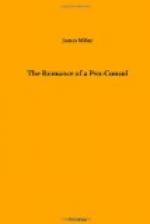Three strides in the open, and three spears had him square and fair, a rent archery target. The first struck his watch, denting it, the second caught the fleshy part of his arm, the third tore into his thigh. The Aborigines were skilled spear-men, and proving it by Sir George’s impalement, they shouted triumph. The shook of the weapons drove him to his knees, but what stung him was the crow of the blacks.
‘That,’ he said, ’produced in me a heated anger, and I was in the fight as I had not been till then. Stung by their mockery, I pulled myself together and was on my feet again in a trice. A spear was still sticking in my thigh, and blood flowed freely from the wound. I dragged out the spear, covered the wound with my haversack, so that neither enemy nor friend might be aware of it, and once more advanced.’
The chief grew alarmed at this steady investment of himself, and showed it by brandishing a club, as if to convey, ’Just you come nearer and this will drum on your head.’
Sir George’s faculties were so keenly edged that he noted, in this bravado, a common link of mankind, high and low, civilised and barbarian. As long as the chieftain had been sure of his skin, he flung spears and sang valiantly; but when alarm entered him, those deadly measures were replaced by a mighty show. On the surface there was vast play of battle, but inwardly quaking. And Sir George marched forward, his right hand gripping the gun hard, his lip quivering, his eye burning.
The injured physical man was triumphant over the peace-loving soul, and anyhow there must now be a lesson. Of all those lines of thought Sir George was not, perhaps, conscious in his peril, yet, fetching back, he could trace them as they had worked. Seeking a solution by measures not violent, he had been given sore spears, whereon his finger tightened at the trigger, and he was a wound automaton; fixed, stern, a fate on feet, bearing down upon the chief in the shelter of the rock.
The brandished club was no stop; no more did the skirmishing support of the clan bring pause to the oncomer. The black general bobbed quite behind his rock, considering the necessity of absolute retreat. Next, he snapped off quickly, dodging here and there, as the aboriginal plan was, to avoid a cast of spears. It was not suited to avoid lead.
Everything had occurred within the space of a few minutes; for such crises do, otherwise the tension would kill. The chief ran; a tall dark body, with many other bodies watching it. Sir George raised his gun and pointed it at the warrior, struggling to a shelter from which the attack could be renewed. Snap went the trigger. With a bullet, the marksman could shoot a greater seabird, by the head, at a range of a hundred yards. This bullet caught the black between the shoulders, and he fell with a thud and a groan. In Sir George, the physical being surrendered itself again to the intellect. The situation was saved, his wounds stung him no more to vindication—he was sorrowful, a-weary.




